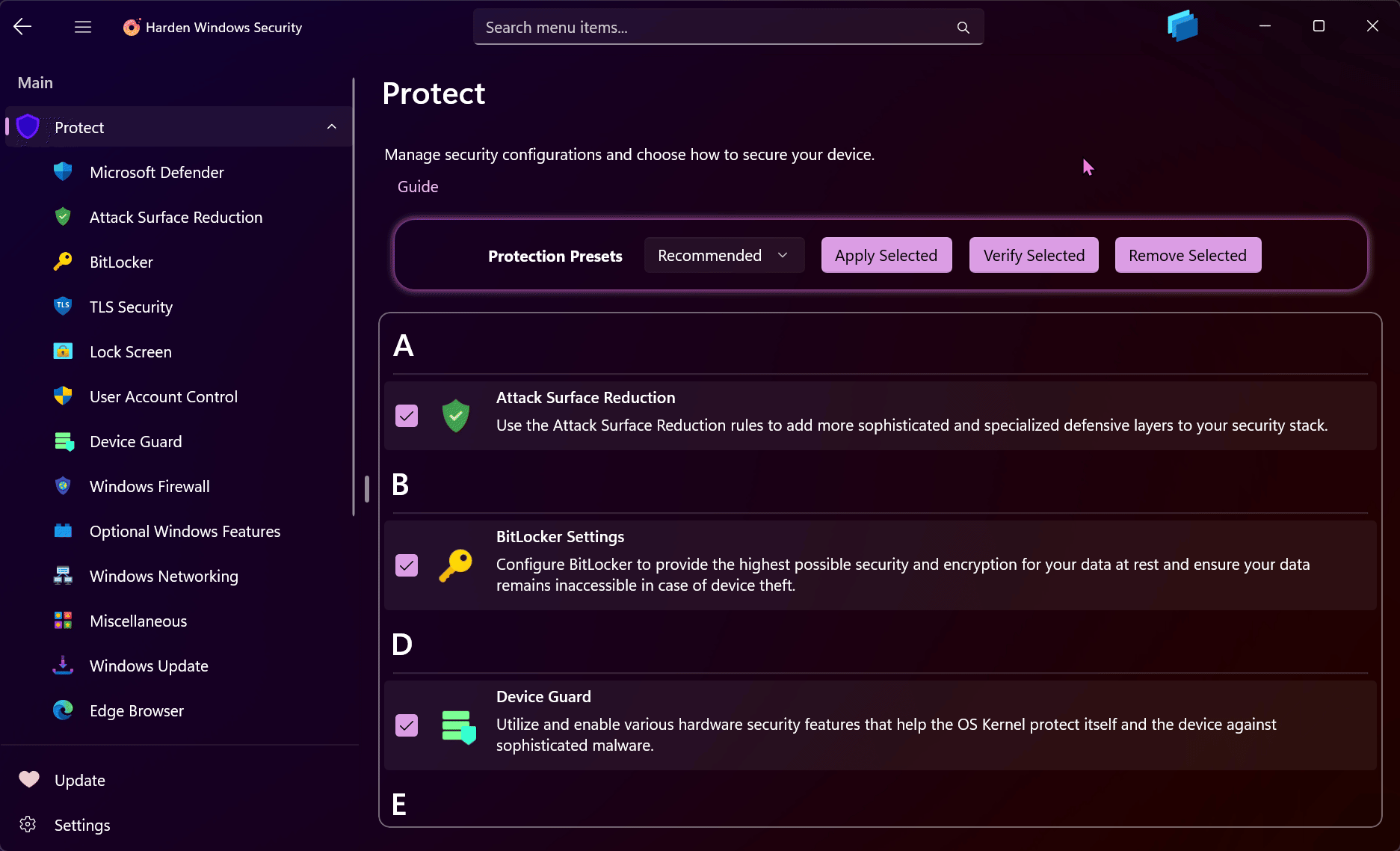Harden System Security¶
Harden System Security is a modern secure lightweight application that can help you harden, secure and lock down your system. It is designed to be user-friendly and efficient, providing a range of features to enhance the security of your Windows operating system.
It always stays up to date with the latest security patches and provides constant and consistent maintenance and support.
How To Install or Update The App ¶
¶
Use The Microsoft Store¶
Use Winget¶
You can utilize Winget to automate the installation of the Harden System Security.
winget install --id 9p7ggfl7dx57 --exact --accept-package-agreements --accept-source-agreements --force --source msstore
Please feel free to open a discussion if you have any questions about the build process, security, how to use or have feedbacks. Source code on this repository
Supported Operation Systems¶
- Windows 11 24H2
- Windows 11 23H2
- Windows 11 22H2
- Windows Server 2025
Preview of the App¶
Technical Details of The App  ¶
¶
- Secure and transparent development and build process.
- Built using WinUI3 / XAML / C#.
- Built using the latest .NET SDK.
- Powered by the WinAppSDK (formerly Project Reunion).
- Packaged with the modern MSIX format.
- Incorporates the Mica material design for backgrounds.
- Adopts the Windows 11 Fluent design system.
- Fast execution and startup time.
- 0 required dependency.
- 0 Third-party library or file used.
- 0 Telemetry or data collection.
- 100% clean uninstallation.
- 100% open-source and free to use.
- Natively supports X64 and ARM64 architectures.
- Full Trimming and Native AOT support.
Features  ¶
¶
![]() Everything always stays up-to-date with the newest proactive security measures that are industry standards and scalable.
Everything always stays up-to-date with the newest proactive security measures that are industry standards and scalable.
![]() No Windows functionality is removed/disabled against Microsoft's recommendations.
No Windows functionality is removed/disabled against Microsoft's recommendations.
![]() All of the links in the documentations and sources are from official Microsoft websites, straight from the source. No bias, No FUD, No misinformation and definitely No old obsolete methods. That's why there are no links to 3rd party news websites, forums, made up blogs/articles, and such.
All of the links in the documentations and sources are from official Microsoft websites, straight from the source. No bias, No FUD, No misinformation and definitely No old obsolete methods. That's why there are no links to 3rd party news websites, forums, made up blogs/articles, and such.
![]() When a security measure is no longer necessary because it's applied by default by Microsoft on new builds of Windows, it will also be removed from the app in order to prevent any problems and because it won't be necessary anymore. Community feedback will always be taken into account when doing so.
When a security measure is no longer necessary because it's applied by default by Microsoft on new builds of Windows, it will also be removed from the app in order to prevent any problems and because it won't be necessary anymore. Community feedback will always be taken into account when doing so.
![]() Applying the security measures can make your system compliant with Microsoft Security Baselines and Secured-core PC specifications (provided that you use modern hardware that supports the latest Windows security features) - See what makes a Secured-core PC - Check Device Guard category for more info
Applying the security measures can make your system compliant with Microsoft Security Baselines and Secured-core PC specifications (provided that you use modern hardware that supports the latest Windows security features) - See what makes a Secured-core PC - Check Device Guard category for more info
Secured-core – recommended for the most sensitive systems and industries like financial, healthcare, and government agencies. Builds on the previous layers and leverages advanced processor capabilities to provide protection from firmware attacks.
![]() Since I originally created this repository for myself and people I care about, I always maintain it to the highest possible standard.
Since I originally created this repository for myself and people I care about, I always maintain it to the highest possible standard.
![]() If you have multiple accounts on your device, you only need to apply the security measures 1 time with Admin privileges, that will make system-wide changes. Then you can optionally run the app, without Admin privileges, for each standard user to apply the Non-Admin category.
If you have multiple accounts on your device, you only need to apply the security measures 1 time with Admin privileges, that will make system-wide changes. Then you can optionally run the app, without Admin privileges, for each standard user to apply the Non-Admin category.
Security  ¶
¶
Important
The Harden System Security application is built publicly using a GitHub Workflow and uploaded to the Microsoft Partner Center for validation and signing. The action uses SBOM (Software Bill of Materials) generation to comply with the highest security standards such as SLSA level 3. GitHub's CodeQL Advanced workflow with extended security model scans the entire repository. All of the dependencies of any project in this repository are uploaded to GitHub and are available in the Dependency Graph.
Harden System Security is architected with a security-first philosophy from its inception. Every feature is designed and implemented with an offensive security mindset, ensuring that security is never an afterthought—and never will be. When selecting a solution tasked with defending critical systems, the last thing you want is a so‑called security tool that silently broadens your attack surface or neglects foundational safeguards. This application is built to be inherently trustworthy, defensible, and resilient.
Dependencies¶
Harden System Security explicitly and unequivocally maintains zero third‑party dependencies. It relies solely on the .NET SDK, the Windows App SDK, and a minimal set of small trusted Microsoft platform components for the User Interface. This deliberate constraint sharply reduces the attack surface and virtually eliminates common software supply chain attack vectors. Rather than pulling transient packages to satisfy feature gaps, required capabilities are purpose‑built in-house—implemented correctly, audibly, and securely. While this increases development effort and time, the mission and deployment contexts of this application more than justify the investment.
Leveraging GitHub's native automation (including Dependabot) alongside Microsoft's patch cadence, security and platform updates can be integrated and released rapidly, preserving both stability and assurance.
Exploit Protection¶
The application avoids dynamic code generation, enhancing security posture and reducing vulnerability exposure. This design ensures compatibility with advanced OS-level exploit mitigation. The Harden System Security supports process mitigations / Exploit Protections such as: Blocking low integrity images, Blocking remote images, Blocking untrusted fonts, Strict Control Flow Guard, Disabling extension points, Export Address Filtering, Hardware enforced stack protection, Import Address Filtering, Validate handle usage, Validate stack integrity.
This disciplined approach bolsters resistance against memory corruption, injection, and tampering techniques frequently leveraged by sophisticated adversaries.
Code Review¶
The codebase is extensively and thoughtfully documented, enabling reviewers to trace logic, validate control flows, and assess security-relevant decisions with minimal friction. I remain fully available to clarify design rationale, threat assumptions, or implementation details whenever deeper scrutiny is desired.
Documentation  ¶
¶
Note
Mixing 3rd party security solutions with advanced Microsoft Defender features or other features offered by the Harden System Security app is not recommended as it can create conflicts.
Symbols Reference¶
The following chart explains various symbols you will see throughout the documentations for the Harden System Security app, helping you understand how they are each applied.
| Indicator | Description |
|---|---|
| Security measure is applied via Registry/API/COM etc. | |
| Security measure is applied via Group Policies | |
| CSP for the security measure | |
| Sub-category |
-
 Microsoft Security Baselines
Microsoft Security Baselines Microsoft Security Baselines Overrides
Microsoft Security Baselines Overrides Microsoft 365 Apps Security Baseline
Microsoft 365 Apps Security Baseline Microsoft Defender
Microsoft Defender Attack Surface Reduction
Attack Surface Reduction Bitlocker
Bitlocker Device Guard
Device Guard TLS Security
TLS Security Lock Screen
Lock Screen User Account Control
User Account Control Windows Firewall
Windows Firewall Optional Windows Features
Optional Windows Features Windows Networking
Windows Networking Miscellaneous Configurations
Miscellaneous Configurations Windows Update
Windows Update Edge Browser
Edge Browser Certificate Checking
Certificate Checking Country IP Blocking
Country IP Blocking Non Admin Measures
Non Admin Measures Group Policy Editor
Group Policy Editor Manage Installed Apps
Manage Installed Apps File Reputation
File Reputation Audit Policies
Audit Policies
Supported Languages¶
The Harden System Security fully supports the following languages.
Under the Hood: Files and Directories Structures Explained¶
Here are the breakdown of some of the directories and files used by the Harden System Security app.
-
Animated Icon Sources is the location hosting JSON content of the Lottie animations used for the animated buttons.
-
Animated Icons contain source generated files used for animated icons in various parts of the app.
-
Resources directory contains JSON data used by the app to apply Security Measures for the following sources:
Group Policies,Registry Keys,Security Policies Registry Keys. -
CountryIPsData contains the JSON files used by the app in the Country IP Blocking page.
-
Mitigations contains files used by the app to apply, verify or remove Exploit Protection for different processes defined in it.
-
DISMService.exe is one of the components of the Harden System Security app that provides DISM functionalities via named pipe.
-
CppInterop directory contains parts of the Harden System Security app written in C++.
If you'd like to know more about a specific file or directory please feel free to reach out.
How To Build The Harden System Security Locally?¶
You can build the Harden System Security application directly from the source code locally on your device without using any 3rd party tools in a completely automated way. It will create the MSIXBundle file containing the X64 and ARM64 MSIX packages.
The build process will generate complete log files and you can use the MSBuild Structured Log Viewer to inspect them.
✨ Click/Tap here to see the PowerShell code ✨
# Requires -Version 7.5
# Requires -RunAsAdministrator
function Build_HSS {
param(
[bool]$DownloadRepo,
[bool]$InstallDeps,
[bool]$Workflow,
[bool]$UpdateWorkLoads,
[bool]$Upload
)
$ErrorActionPreference = 'Stop'
$Stopwatch = [System.Diagnostics.Stopwatch]::StartNew()
Set-ItemProperty -Path 'HKLM:\SYSTEM\CurrentControlSet\Control\FileSystem' -Name 'LongPathsEnabled' -Value 1 -Force
[System.String]$script:AppControlManagerDirectory
if ($DownloadRepo) {
[System.String]$BranchName = 'main'
[System.String]$RepoName = 'Harden-Windows-Security'
[System.String]$RepoUrl = "https://github.com/HotCakeX/$RepoName/archive/refs/heads/$BranchName.zip"
[System.String]$ZipPath = [System.IO.Path]::Combine($env:TEMP, "$RepoName.zip")
[System.String]$InitialWorkingDirectory = $PWD.Path
$script:AppControlManagerDirectory = [System.IO.Path]::Combine($InitialWorkingDirectory, "$RepoName-$BranchName", 'Harden System Security')
if (Test-Path -Path $script:AppControlManagerDirectory -PathType Container) {
Remove-Item -Path $script:AppControlManagerDirectory -Recurse -Force
}
Invoke-WebRequest -Uri $RepoUrl -OutFile $ZipPath
Expand-Archive -Path $ZipPath -DestinationPath $InitialWorkingDirectory -Force
Remove-Item -Path $ZipPath -Force
Set-Location -Path $script:AppControlManagerDirectory
}
else {
$script:AppControlManagerDirectory = $PWD.Path
}
if ($InstallDeps) {
# Install Winget if it doesn't exist
if (!(Get-Command -Name 'winget.exe' -ErrorAction Ignore)) {
# Retrieve the latest Winget release information
$WingetReleases = Invoke-RestMethod -Uri 'https://api.github.com/repos/microsoft/winget-cli/releases'
$LatestRelease = $WingetReleases | Select-Object -First 1
# Direct links to the latest Winget release assets
[string]$WingetURL = $LatestRelease.assets.browser_download_url | Where-Object -FilterScript { $_.EndsWith('.msixbundle') } | Select-Object -First 1
[string]$WingetLicense = $LatestRelease.assets.browser_download_url | Where-Object -FilterScript { $_.EndsWith('License1.xml') } | Select-Object -First 1
[string]$LatestWingetReleaseDependenciesZipURL = $LatestRelease.assets.browser_download_url | Where-Object -FilterScript { $_.EndsWith('DesktopAppInstaller_Dependencies.zip') } | Select-Object -First 1
[hashtable]$Downloads = @{
# 'Winget.msixbundle' = 'https://aka.ms/getwinget' This is updated slower than the GitHub release
'DesktopAppInstaller_Dependencies.zip' = $LatestWingetReleaseDependenciesZipURL
'Winget.msixbundle' = $WingetURL
'License1.xml' = $WingetLicense
}
$Downloads.GetEnumerator() | ForEach-Object -Parallel {
Invoke-RestMethod -Uri $_.Value -OutFile $_.Key
}
Expand-Archive -Path 'DesktopAppInstaller_Dependencies.zip' -DestinationPath .\ -Force
# Required to update the Winget
Stop-Process -Name 'WindowsTerminal' -Force -ErrorAction Ignore
# Get the paths to all of the dependencies
[string[]]$DependencyPaths = (Get-ChildItem -Path .\x64 -Filter '*.appx' -File -Force).FullName
Add-AppxProvisionedPackage -Online -PackagePath 'Winget.msixbundle' -DependencyPackagePath $DependencyPaths -LicensePath 'License1.xml'
Add-AppPackage -Path 'Winget.msixbundle' -DependencyPath "$($DependencyPaths[0])", "$($DependencyPaths[1])" -ForceTargetApplicationShutdown -ForceUpdateFromAnyVersion
}
Write-Host -Object 'The version of the Winget currently in use:'
Write-Host -Object (winget --version)
winget source update
Write-Host -Object "`nInstalling Rust toolchain" -ForegroundColor Magenta
$null = winget install --id Rustlang.Rustup --exact --accept-package-agreements --accept-source-agreements --uninstall-previous --force --source winget
if ($LASTEXITCODE -ne 0) { throw [System.InvalidOperationException]::New("Failed to install the Rust toolchain: $LASTEXITCODE") }
Write-Host -Object "`nInstalling .NET SDK" -ForegroundColor Magenta
$null = winget install --id Microsoft.DotNet.SDK.Preview --exact --accept-package-agreements --accept-source-agreements --uninstall-previous --force --source winget
if ($LASTEXITCODE -ne 0) { throw [System.InvalidOperationException]::New("Failed to install .NET SDK: $LASTEXITCODE") }
Write-Host -Object "`nInstalling Visual Studio Build Tools" -ForegroundColor Magenta
# Downloads the online installer and automatically runs it and installs the build tools
# https://learn.microsoft.com/windows/apps/windows-app-sdk/set-up-your-development-environment
# https://learn.microsoft.com/visualstudio/install/workload-component-id-vs-build-tools
# https://learn.microsoft.com/visualstudio/install/use-command-line-parameters-to-install-visual-studio
# https://learn.microsoft.com/visualstudio/install/workload-component-id-vs-community
winget install --id Microsoft.VisualStudio.2022.BuildTools --exact --accept-package-agreements --accept-source-agreements --uninstall-previous --force --source winget --override '--force --wait --passive --add Microsoft.VisualStudio.Workload.VCTools --add Microsoft.VisualStudio.Workload.MSBuildTools --add Microsoft.VisualStudio.Workload.UniversalBuildTools --add Microsoft.VisualStudio.Component.VC.Tools.x86.x64 --add Microsoft.VisualStudio.Component.Windows11SDK.26100 --includeRecommended --add Microsoft.VisualStudio.Component.VC.Tools.ARM64'
if ($LASTEXITCODE -ne 0) { throw [System.InvalidOperationException]::New('Failed to install Visual Studio Build Tools') }
winget install --id Microsoft.VCRedist.2015+.x64 --exact --accept-package-agreements --accept-source-agreements --uninstall-previous --force --source winget
}
# Refresh the environment variables so the current session detects the new dotnet installation
$Env:Path = [System.Environment]::GetEnvironmentVariable('Path', [System.EnvironmentVariableTarget]::Machine) + ';' +
[System.Environment]::GetEnvironmentVariable('Path', [System.EnvironmentVariableTarget]::User)
# https://github.com/Microsoft/vswhere/wiki/Start-Developer-Command-Prompt#using-powershell
$installationPath = . 'C:\Program Files (x86)\Microsoft Visual Studio\Installer\vswhere.exe' -prerelease -latest -property installationPath
if ($installationPath -and (Test-Path -Path "$installationPath\Common7\Tools\vsdevcmd.bat" -PathType Leaf)) {
& "${env:COMSPEC}" /s /c "`"$installationPath\Common7\Tools\vsdevcmd.bat`" -no_logo && set" | ForEach-Object -Process {
$name, $value = $_ -split '=', 2
Set-Content -Path env:\"$name" -Value $value -Force
Write-Host -Object "Setting environment variable: $name=$value"
}
}
# Remove any possible existing directories
Remove-Item -Path .\MSIXOutputX64 -Recurse -Force -ErrorAction Ignore
Remove-Item -Path .\MSIXOutputARM64 -Recurse -Force -ErrorAction Ignore
Remove-Item -Path .\MSIXBundleOutput -Recurse -Force -ErrorAction Ignore
Remove-Item -Path .\bin -Recurse -Force -ErrorAction Ignore
Remove-Item -Path .\obj -Recurse -Force -ErrorAction Ignore
if ($UpdateWorkLoads) {
# Update the workloads
dotnet workload update
dotnet workload config --update-mode workload-set
dotnet workload update
if ($LASTEXITCODE -ne 0) { throw [System.InvalidOperationException]::New("Failed updating the workloads. Exit Code: $LASTEXITCODE") }
}
Write-Host -Object "`nChecking .NET info`n`n" -ForegroundColor Magenta
dotnet --info
Write-Host -Object "`nListing installed .NET SDKs`n`n" -ForegroundColor Magenta
dotnet --list-sdks
function Find-mspdbcmf {
# "-products *" is necessary to detect BuildTools too
[string]$VisualStudioPath = . 'C:\Program Files (x86)\Microsoft Visual Studio\Installer\vswhere.exe' -prerelease -latest -property resolvedInstallationPath -products *
[string]$BasePath = [System.IO.Path]::Combine($VisualStudioPath, 'VC', 'Tools', 'MSVC')
# Get all subdirectories under the base path
[System.String[]]$VersionDirs = [System.IO.Directory]::GetDirectories($BasePath)
# Initialize the highest version with a minimal version value.
[System.Version]$HighestVersion = [System.Version]::New('0.0.0.0')
[System.String]$HighestVersionFolder = $null
# Loop through each directory to find the highest version folder.
foreach ($Dir in $VersionDirs) {
# Extract the folder name
[System.String]$FolderName = [System.IO.Path]::GetFileName($Dir)
[System.Version]$CurrentVersion = $null
# Try parsing the folder name as a Version.
if ([System.Version]::TryParse($FolderName, [ref] $CurrentVersion)) {
# Compare versions
if ($CurrentVersion.CompareTo($HighestVersion) -gt 0) {
$HighestVersion = $CurrentVersion
$HighestVersionFolder = $FolderName
}
}
}
# If no valid version folder is found
if (!$HighestVersionFolder) {
throw [System.IO.DirectoryNotFoundException]::New("No valid version directories found in $BasePath")
}
# Combine the base path, the highest version folder, the architecture folder, and the file name.
[System.String]$mspdbcmfPath = [System.IO.Path]::Combine($BasePath, $HighestVersionFolder, 'bin', 'Hostx64', 'x64', 'mspdbcmf.exe')
if (![System.IO.File]::Exists($mspdbcmfPath)) {
throw [System.IO.FileNotFoundException]::New("mspdbcmf.exe not found at $mspdbcmfPath")
}
return $mspdbcmfPath
}
[string]$mspdbcmfPath = Find-mspdbcmf
function Find-MSBuild {
# "-products *" is necessary to detect BuildTools too
[string]$VisualStudioPath = . 'C:\Program Files (x86)\Microsoft Visual Studio\Installer\vswhere.exe' -prerelease -latest -property resolvedInstallationPath -products *
[string]$MSBuildPath = [System.IO.Path]::Combine($VisualStudioPath, 'MSBuild', 'Current', 'Bin', 'MSBuild.exe')
if (![System.IO.File]::Exists($MSBuildPath)) {
throw [System.IO.FileNotFoundException]::New("MSBuild.exe not found at $MSBuildPath")
}
return $MSBuildPath
}
[string]$MSBuildPath = Find-MSBuild
#region --- Compile C++ projects ---
### ComManager
. $MSBuildPath '..\AppControl Manager\eXclude\ComManager\ComManager.slnx' /p:Configuration=Release /p:Platform=x64 /target:"clean;Rebuild"
if ($LASTEXITCODE -ne 0) { throw [System.InvalidOperationException]::New("Failed building MS Defender solution for X64. Exit Code: $LASTEXITCODE") }
. $MSBuildPath '..\AppControl Manager\eXclude\ComManager\ComManager.slnx' /p:Configuration=Release /p:Platform=arm64 /target:"clean;Rebuild"
if ($LASTEXITCODE -ne 0) { throw [System.InvalidOperationException]::New("Failed building MS Defender solution for ARM64. Exit Code: $LASTEXITCODE") }
#region --- RUST projects ---
# Uncomment this once stable toolchain supports ehcont security feature, till then we use nightly only
# rustup default stable
rustup default nightly
if ($LASTEXITCODE -ne 0) { throw [System.InvalidOperationException]::New("Failed setting Rust toolchain to Stable. Exit Code: $LASTEXITCODE") }
rustup target add aarch64-pc-windows-msvc
if ($LASTEXITCODE -ne 0) { throw [System.InvalidOperationException]::New("Failed adding aarch64-pc-windows-msvc target to Rust toolchain. Exit Code: $LASTEXITCODE") }
rustup target add x86_64-pc-windows-msvc
if ($LASTEXITCODE -ne 0) { throw [System.InvalidOperationException]::New("Failed adding x86_64-pc-windows-msvc target to Rust toolchain. Exit Code: $LASTEXITCODE") }
rustup update
if ($LASTEXITCODE -ne 0) { throw [System.InvalidOperationException]::New("Failed updating Rust. Exit Code: $LASTEXITCODE") }
cargo version
if ($LASTEXITCODE -ne 0) { throw [System.InvalidOperationException]::New("Failed checking for Rust version. Exit Code: $LASTEXITCODE") }
[string]$Current_Location = (Get-Location).Path
Set-Location -Path '..\AppControl Manager\eXclude\Rust Interop Library'
if (Test-Path -PathType Leaf -LiteralPath 'Cargo.lock') {
Remove-Item -Force -LiteralPath 'Cargo.lock'
}
rustup toolchain install nightly
if ($LASTEXITCODE -ne 0) { throw [System.InvalidOperationException]::New("Failed installing nightly Rust toolchain. Exit Code: $LASTEXITCODE") }
rustup default nightly
if ($LASTEXITCODE -ne 0) { throw [System.InvalidOperationException]::New("Failed setting Rust toolchain to Nightly. Exit Code: $LASTEXITCODE") }
rustup component add rust-src --toolchain nightly-x86_64-pc-windows-msvc
if ($LASTEXITCODE -ne 0) { throw [System.InvalidOperationException]::New("Failed adding rust-src component to Nightly toolchain. Exit Code: $LASTEXITCODE") }
rustup update
if ($LASTEXITCODE -ne 0) { throw [System.InvalidOperationException]::New("Failed updating Rust. Exit Code: $LASTEXITCODE") }
cargo version
if ($LASTEXITCODE -ne 0) { throw [System.InvalidOperationException]::New("Failed checking for Rust version. Exit Code: $LASTEXITCODE") }
cargo clean
if ($LASTEXITCODE -ne 0) { throw [System.InvalidOperationException]::New("Failed cleaning the Rust project. Exit Code: $LASTEXITCODE") }
cargo update --verbose
if ($LASTEXITCODE -ne 0) { throw [System.InvalidOperationException]::New("Failed updating Rust. Exit Code: $LASTEXITCODE") }
cargo tree
rustup show active-toolchain
if ($LASTEXITCODE -ne 0) { throw [System.InvalidOperationException]::New("Failed showing active Rust toolchain. Exit Code: $LASTEXITCODE") }
cargo build_x64
if ($LASTEXITCODE -ne 0) { throw [System.InvalidOperationException]::New("Failed building x64 Rust Interop project. Exit Code: $LASTEXITCODE") }
cargo build_arm64
if ($LASTEXITCODE -ne 0) { throw [System.InvalidOperationException]::New("Failed building ARM64 Rust Interop project. Exit Code: $LASTEXITCODE") }
Set-Location -Path $Current_Location
#endregion
#region --- C# projects ---
dotnet restore '..\AppControl Manager\eXclude\DISMService\DISMService.csproj' -r win-x64
if ($LASTEXITCODE -ne 0) { throw [System.InvalidOperationException]::New("Failed restoring DISMService for x64. Exit Code: $LASTEXITCODE") }
dotnet restore '..\AppControl Manager\eXclude\DISMService\DISMService.csproj' -r win-arm64
if ($LASTEXITCODE -ne 0) { throw [System.InvalidOperationException]::New("Failed restoring DISMService for ARM64. Exit Code: $LASTEXITCODE") }
dotnet clean '..\AppControl Manager\eXclude\DISMService\DISMService.slnx' --configuration Release
if ($LASTEXITCODE -ne 0) { throw [System.InvalidOperationException]::New("Failed cleaning DISMService (first pass). Exit Code: $LASTEXITCODE") }
dotnet build '..\AppControl Manager\eXclude\DISMService\DISMService.slnx' --configuration Release --verbosity minimal
if ($LASTEXITCODE -ne 0) { throw [System.InvalidOperationException]::New("Failed building DISMService (first pass). Exit Code: $LASTEXITCODE") }
dotnet msbuild '..\AppControl Manager\eXclude\DISMService\DISMService.slnx' /p:Configuration=Release /restore /p:Platform=x64 /p:PublishProfile="..\AppControl Manager\eXclude\DISMService\Properties\PublishProfiles\win-x64.pubxml" /t:Publish -v:minimal
if ($LASTEXITCODE -ne 0) { throw [System.InvalidOperationException]::New("Failed publishing DISMService for x64. Exit Code: $LASTEXITCODE") }
dotnet clean '..\AppControl Manager\eXclude\DISMService\DISMService.slnx' --configuration Release
if ($LASTEXITCODE -ne 0) { throw [System.InvalidOperationException]::New("Failed cleaning DISMService (second pass). Exit Code: $LASTEXITCODE") }
dotnet build '..\AppControl Manager\eXclude\DISMService\DISMService.slnx' --configuration Release --verbosity minimal
if ($LASTEXITCODE -ne 0) { throw [System.InvalidOperationException]::New("Failed building DISMService (second pass). Exit Code: $LASTEXITCODE") }
dotnet msbuild '..\AppControl Manager\eXclude\DISMService\DISMService.slnx' /p:Configuration=Release /restore /p:Platform=arm64 /p:PublishProfile="..\AppControl Manager\eXclude\DISMService\Properties\PublishProfiles\win-arm64.pubxml" /t:Publish -v:minimal
if ($LASTEXITCODE -ne 0) { throw [System.InvalidOperationException]::New("Failed publishing DISMService for ARM64. Exit Code: $LASTEXITCODE") }
#endregion
[string]$CsProjFilePath = (Resolve-Path -Path '.\Harden System Security.csproj').Path
# https://learn.microsoft.com/dotnet/core/tools/dotnet-build
# https://learn.microsoft.com/visualstudio/msbuild/msbuild-command-line-reference
# https://learn.microsoft.com/visualstudio/msbuild/common-msbuild-project-properties
# Copy the X64 components to the directory before the build starts
Copy-Item -Path '..\AppControl Manager\eXclude\ComManager\x64\Release\ComManager.exe' -Destination '.\CppInterop\ComManager.exe' -Force
Copy-Item -Path '..\AppControl Manager\eXclude\DISMService\OutputX64\DISMService.exe' -Destination '.\DISMService.exe' -Force
# Generate for X64 architecture
dotnet clean 'Harden System Security.slnx' --configuration Release
dotnet build 'Harden System Security.slnx' --configuration Release --verbosity minimal /p:Platform=x64
if ($LASTEXITCODE -ne 0) { throw [System.InvalidOperationException]::New("Failed building x64 Harden System Security project. Exit Code: $LASTEXITCODE") }
dotnet msbuild 'Harden System Security.slnx' /p:Configuration=Release /p:AppxPackageDir="MSIXOutputX64\" /p:GenerateAppxPackageOnBuild=true /p:Platform=x64 -v:minimal /p:MsPdbCmfExeFullpath=$mspdbcmfPath -bl:X64MSBuildLog.binlog
if ($LASTEXITCODE -ne 0) { throw [System.InvalidOperationException]::New("Failed packaging x64 Harden System Security project. Exit Code: $LASTEXITCODE") }
# Copy the ARM64 components to the directory before the build starts
Copy-Item -Path '..\AppControl Manager\eXclude\ComManager\ARM64\Release\ComManager.exe' -Destination '.\CppInterop\ComManager.exe' -Force
Copy-Item -Path '..\AppControl Manager\eXclude\DISMService\OutputARM64\DISMService.exe' -Destination '.\DISMService.exe' -Force
# Generate for ARM64 architecture
dotnet clean 'Harden System Security.slnx' --configuration Release
dotnet build 'Harden System Security.slnx' --configuration Release --verbosity minimal /p:Platform=ARM64
if ($LASTEXITCODE -ne 0) { throw [System.InvalidOperationException]::New("Failed building ARM64 Harden System Security project. Exit Code: $LASTEXITCODE") }
dotnet msbuild 'Harden System Security.slnx' /p:Configuration=Release /p:AppxPackageDir="MSIXOutputARM64\" /p:GenerateAppxPackageOnBuild=true /p:Platform=ARM64 -v:minimal /p:MsPdbCmfExeFullpath=$mspdbcmfPath -bl:ARM64MSBuildLog.binlog
if ($LASTEXITCODE -ne 0) { throw [System.InvalidOperationException]::New("Failed packaging ARM64 Harden System Security project. Exit Code: $LASTEXITCODE") }
function Get-MSIXFile {
param(
[System.String]$BasePath,
[System.String]$FolderPattern,
[System.String]$FileNamePattern,
[System.String]$ErrorMessageFolder,
[System.String]$ErrorMessageFile
)
# Get all subdirectories in the base path matching the folder pattern
[System.String[]]$Folders = [System.IO.Directory]::GetDirectories($BasePath)
[System.String]$DetectedFolder = $null
foreach ($Folder in $Folders) {
if ([System.Text.RegularExpressions.Regex]::IsMatch($Folder, $FolderPattern)) {
$DetectedFolder = $Folder
break
}
}
if (!$DetectedFolder) {
throw [System.InvalidOperationException]::New($ErrorMessageFolder)
}
# Get the full path of the first file matching the file name pattern inside the found folder
[System.String[]]$Files = [System.IO.Directory]::GetFiles($DetectedFolder)
[System.String]$DetectedFile = $null
foreach ($File in $Files) {
if ([System.Text.RegularExpressions.Regex]::IsMatch($File, $FileNamePattern)) {
$DetectedFile = $File
break
}
}
if (!$DetectedFile) {
throw [System.InvalidOperationException]::New($ErrorMessageFile)
}
return $DetectedFile
}
#region Finding X64 outputs
[System.String]$FinalMSIXX64Path = Get-MSIXFile -BasePath ([System.IO.Path]::Combine($PWD.Path, 'MSIXOutputX64')) -FolderPattern 'Harden System Security_\d+\.\d+\.\d+\.\d+_Test' -FileNamePattern 'Harden System Security_\d+\.\d+\.\d+\.\d+_x64\.msix' -ErrorMessageFolder 'Could not find the directory for X64 MSIX file' -ErrorMessageFile 'Could not find the X64 MSIX file'
[System.String]$FinalMSIXX64Name = [System.IO.Path]::GetFileName($FinalMSIXX64Path)
[System.String]$FinalMSIXX64SymbolPath = Get-MSIXFile -BasePath ([System.IO.Path]::Combine($PWD.Path, 'MSIXOutputX64')) -FolderPattern 'Harden System Security_\d+\.\d+\.\d+\.\d+_Test' -FileNamePattern 'Harden System Security_\d+\.\d+\.\d+\.\d+_x64\.msixsym' -ErrorMessageFolder 'Could not find the directory for X64 symbol file' -ErrorMessageFile 'Could not find the X64 symbol file'
[System.String]$FinalMSIXX64SymbolName = [System.IO.Path]::GetFileName($FinalMSIXX64SymbolPath)
#endregion
#region Finding ARM64 outputs
[System.String]$FinalMSIXARM64Path = Get-MSIXFile -BasePath ([System.IO.Path]::Combine($PWD.Path, 'MSIXOutputARM64')) -FolderPattern 'Harden System Security_\d+\.\d+\.\d+\.\d+_Test' -FileNamePattern 'Harden System Security_\d+\.\d+\.\d+\.\d+_arm64\.msix' -ErrorMessageFolder 'Could not find the directory for ARM64 MSIX file' -ErrorMessageFile 'Could not find the ARM64 MSIX file'
[System.String]$FinalMSIXARM64Name = [System.IO.Path]::GetFileName($FinalMSIXARM64Path)
[System.String]$FinalMSIXARM64SymbolPath = Get-MSIXFile -BasePath ([System.IO.Path]::Combine($PWD.Path, 'MSIXOutputARM64')) -FolderPattern 'Harden System Security_\d+\.\d+\.\d+\.\d+_Test' -FileNamePattern 'Harden System Security_\d+\.\d+\.\d+\.\d+_arm64\.msixsym' -ErrorMessageFolder 'Could not find the directory for ARM64 symbol file' -ErrorMessageFile 'Could not find the ARM64 symbol file'
[System.String]$FinalMSIXARM64SymbolName = [System.IO.Path]::GetFileName($FinalMSIXARM64SymbolPath)
#endregion
#region Detect and Validate File Versions
[System.Text.RegularExpressions.Regex]$versionRegexX64 = [System.Text.RegularExpressions.Regex]::New('Harden System Security_(\d+\.\d+\.\d+\.\d+)_x64\.msix')
[System.Text.RegularExpressions.Regex]$versionRegexARM64 = [System.Text.RegularExpressions.Regex]::New('Harden System Security_(\d+\.\d+\.\d+\.\d+)_arm64\.msix')
[System.Text.RegularExpressions.Match]$MatchX64 = $versionRegexX64.Match($FinalMSIXX64Name)
[System.Text.RegularExpressions.Match]$MatchARM64 = $versionRegexARM64.Match($FinalMSIXARM64Name)
if (!$MatchX64.Success) {
throw [System.InvalidOperationException]::New('Could not detect version from X64 file name')
}
if (!$MatchARM64.Success) {
throw [System.InvalidOperationException]::New('Could not detect version from ARM64 file name')
}
[System.String]$versionX64 = $MatchX64.Groups[1].Value
[System.String]$versionARM64 = $MatchARM64.Groups[1].Value
if ($versionX64 -ne $versionARM64) {
throw [System.InvalidOperationException]::New('The versions in X64 and ARM64 files do not match')
}
# Craft the file name for the MSIX Bundle file
[System.String]$FinalBundleFileName = "Harden System Security_$versionX64.msixbundle"
#endregion
# Creating the directory where the MSIX packages will be copied to
[System.String]$MSIXBundleOutput = [System.IO.Directory]::CreateDirectory([System.IO.Path]::Combine($script:AppControlManagerDirectory, 'MSIXBundleOutput')).FullName
[System.IO.File]::Copy($FinalMSIXX64Path, [System.IO.Path]::Combine($MSIXBundleOutput, $FinalMSIXX64Name), $true)
[System.IO.File]::Copy($FinalMSIXARM64Path, [System.IO.Path]::Combine($MSIXBundleOutput, $FinalMSIXARM64Name), $true)
# The path to the final MSIX Bundle file
[System.String]$MSIXBundle = [System.IO.Path]::Combine($MSIXBundleOutput, $FinalBundleFileName)
function Get-MakeAppxPath {
[System.String]$BasePath = 'C:\Program Files (x86)\Windows Kits\10\bin'
# Get all subdirectories under the base path
[System.String[]]$VersionDirs = [System.IO.Directory]::GetDirectories($BasePath)
# Initialize the highest version with a minimal version value.
[System.Version]$HighestVersion = [System.Version]::New('0.0.0.0')
[System.String]$HighestVersionFolder = $null
# Loop through each directory to find the highest version folder.
foreach ($Dir in $VersionDirs) {
# Extract the folder name
[System.String]$FolderName = [System.IO.Path]::GetFileName($Dir)
[System.Version]$CurrentVersion = $null
# Try parsing the folder name as a Version.
if ([System.Version]::TryParse($FolderName, [ref] $CurrentVersion)) {
# Compare versions
if ($CurrentVersion.CompareTo($HighestVersion) -gt 0) {
$HighestVersion = $CurrentVersion
$HighestVersionFolder = $FolderName
}
}
}
# If no valid version folder is found
if (!$HighestVersionFolder) {
throw [System.IO.DirectoryNotFoundException]::New("No valid version directories found in $BasePath")
}
[string]$CPUArch = @{AMD64 = 'x64'; ARM64 = 'arm64' }[$Env:PROCESSOR_ARCHITECTURE]
if ([System.String]::IsNullOrWhiteSpace($CPUArch)) { throw [System.PlatformNotSupportedException]::New('Only AMD64 and ARM64 architectures are supported.') }
# Combine the base path, the highest version folder, the architecture folder, and the file name.
[System.String]$MakeAppxPath = [System.IO.Path]::Combine($BasePath, $HighestVersionFolder, $CPUArch, 'makeappx.exe')
return $MakeAppxPath
}
[System.String]$MakeAppxPath = Get-MakeAppxPath
if ([System.string]::IsNullOrWhiteSpace($MakeAppxPath)) {
throw [System.IO.FileNotFoundException]::New('Could not find the makeappx.exe')
}
# https://learn.microsoft.com/windows/win32/appxpkg/make-appx-package--makeappx-exe-#to-create-a-package-bundle-using-a-directory-structure
. $MakeAppxPath bundle /d $MSIXBundleOutput /p $MSIXBundle /o /v
if ($LASTEXITCODE -ne 0) { throw [System.InvalidOperationException]::New("MakeAppx failed creating the MSIXBundle. Exit Code: $LASTEXITCODE") }
#Endregion
Write-Host -Object "X64 MSIX File Path: $FinalMSIXX64Path" -ForegroundColor Green
Write-Host -Object "X64 MSIX File Name: $FinalMSIXX64Name" -ForegroundColor Green
Write-Host -Object "X64 Symbols: $FinalMSIXX64SymbolPath" -ForegroundColor Green
Write-Host -Object "ARM64 MSIX File Path: $FinalMSIXARM64Path" -ForegroundColor Cyan
Write-Host -Object "ARM64 MSIX File Name: $FinalMSIXARM64Name" -ForegroundColor Cyan
Write-Host -Object "ARM64 Symbols: $FinalMSIXARM64SymbolPath" -ForegroundColor Cyan
Write-Host -Object "MSIX Bundle File Path: $MSIXBundle" -ForegroundColor Yellow
Write-Host -Object "MSIX Bundle File Name: $FinalBundleFileName" -ForegroundColor Yellow
if ($Workflow) {
[XML]$CSProjXMLContent = Get-Content -Path $CsProjFilePath -Force
[string]$MSIXVersion = $CSProjXMLContent.Project.PropertyGroup.FileVersion
[string]$MSIXVersion = $MSIXVersion.Trim() # It would have trailing whitespaces
if ([string]::IsNullOrWhiteSpace($FinalMSIXX64Path) -or [string]::IsNullOrWhiteSpace($FinalMSIXX64Name) -or [string]::IsNullOrWhiteSpace($MSIXVersion)) { throw 'Necessary info could not be found' }
# Write the MSIXVersion to GITHUB_ENV to set it as an environment variable for the entire workflow
Add-Content -Path ($env:GITHUB_ENV, $env:GITHUB_OUTPUT) -Value "PACKAGE_VERSION=$MSIXVersion"
# Saving the details for the MSIX Bundle file
Add-Content -Path ($env:GITHUB_ENV, $env:GITHUB_OUTPUT) -Value "MSIXBundle_PATH=$MSIXBundle"
Add-Content -Path ($env:GITHUB_ENV, $env:GITHUB_OUTPUT) -Value "MSIXBundle_NAME=$FinalBundleFileName"
# Saving the details of the log files
Add-Content -Path ($env:GITHUB_ENV, $env:GITHUB_OUTPUT) -Value "X64MSBuildLog_PATH=$((Resolve-Path -Path .\X64MSBuildLog.binlog).Path)"
Add-Content -Path ($env:GITHUB_ENV, $env:GITHUB_OUTPUT) -Value "ARM64MSBuildLog_PATH=$((Resolve-Path -Path .\ARM64MSBuildLog.binlog).Path)"
# Saving the details of the X64 symbol file
Add-Content -Path ($env:GITHUB_ENV, $env:GITHUB_OUTPUT) -Value "X64Symbol_PATH=$FinalMSIXX64SymbolPath"
Add-Content -Path ($env:GITHUB_ENV, $env:GITHUB_OUTPUT) -Value "X64Symbol_NAME=$FinalMSIXX64SymbolName"
# Saving the details of the ARM64 symbol file
Add-Content -Path ($env:GITHUB_ENV, $env:GITHUB_OUTPUT) -Value "ARM64Symbol_PATH=$FinalMSIXARM64SymbolPath"
Add-Content -Path ($env:GITHUB_ENV, $env:GITHUB_OUTPUT) -Value "ARM64Symbol_NAME=$FinalMSIXARM64SymbolName"
# https://github.com/microsoft/sbom-tool
# Generating SBOM
Invoke-WebRequest -Uri 'https://github.com/microsoft/sbom-tool/releases/latest/download/sbom-tool-win-x64.exe' -OutFile "${Env:RUNNER_TEMP}\sbom-tool.exe"
# https://github.com/microsoft/sbom-tool/blob/main/docs/sbom-tool-arguments.md
. "${Env:RUNNER_TEMP}\sbom-tool.exe" generate -b $MSIXBundleOutput -bc .\ -pn 'Harden System Security' -ps 'Violet Hansen' -pv $MSIXVersion -nsb 'https://github.com/HotCakeX/Harden-Windows-Security' -V Verbose -gt true -li true -pm true -D true -lto 80
# Saving the details of the SBOM file
Add-Content -Path ($env:GITHUB_ENV, $env:GITHUB_OUTPUT) -Value "SBOM_PATH=$MSIXBundleOutput/_manifest/spdx_2.2/manifest.spdx.json"
Add-Content -Path ($env:GITHUB_ENV, $env:GITHUB_OUTPUT) -Value 'SBOM_NAME=manifest.spdx.json'
}
if ($Upload) {
dotnet clean '..\AppControl Manager\eXclude\PartnerCenter\PartnerCenter.slnx' --configuration Release
dotnet build '..\AppControl Manager\eXclude\PartnerCenter\PartnerCenter.slnx' --configuration Release --verbosity minimal
dotnet msbuild '..\AppControl Manager\eXclude\PartnerCenter\PartnerCenter.slnx' /p:Configuration=Release /p:Platform=x64 /p:PublishProfile=win-x64 /t:Publish -v:minimal
[System.String]$TokenEndpoint = $env:PARTNERCENTER_TOKENENDPOINT
[System.String]$ClientId = $env:PARTNERCENTER_CLIENTID
[System.String]$ClientSecret = $env:PARTNERCENTER_CLIENTSECRET
[System.String]$ApplicationId = $env:PARTNERCENTER_APPLICATIONID_HSS
[System.String]$PackageFilePath = $MSIXBundle
[System.String]$ReleaseNotesFilePath = (Resolve-Path -Path ReleaseNotes.txt).Path
. '..\AppControl Manager\eXclude\PartnerCenter\X64Output\PartnerCenter.exe' $TokenEndpoint $ClientId $ClientSecret $ApplicationId $PackageFilePath $ReleaseNotesFilePath
}
if ($null -ne $Stopwatch) {
$Stopwatch.Stop()
$Elapsed = $Stopwatch.Elapsed
[string]$Result = @"
Execution Time:
----------------------------
Total Time : $($Elapsed.ToString('g'))
Hours : $($Elapsed.Hours)
Minutes : $($Elapsed.Minutes)
Seconds : $($Elapsed.Seconds)
Milliseconds : $($Elapsed.Milliseconds)
----------------------------
"@
Write-Host -Object $Result -ForegroundColor Cyan
}
}
# For GitHub workflow
# Build_HSS -DownloadRepo $false -InstallDeps $false -Workflow $true -UpdateWorkLoads $false -Upload $true
# Local - ARM64 + X64
Build_HSS -DownloadRepo $true -InstallDeps $true -Workflow $false -UpdateWorkLoads $false -Upload $false

